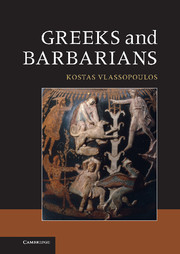Book contents
- Frontmatter
- Contents
- List of Maps and figures
- Acknowledgements
- Note to the reader
- List of Abbreviations
- 1 Introduction
- 2 The Panhellenic world and the world of empires
- 3 The world of networks and the world of apoikiai
- 4 Intercultural communication
- 5 The Barbarian repertoire in Greek culture
- 6 Globalisation and glocalisation
- 7 The Hellenistic world
- 8 Conclusions
- Bibliography
- Index locorum
- Index
2 - The Panhellenic world and the world of empires
Published online by Cambridge University Press: 05 June 2013
- Frontmatter
- Contents
- List of Maps and figures
- Acknowledgements
- Note to the reader
- List of Abbreviations
- 1 Introduction
- 2 The Panhellenic world and the world of empires
- 3 The world of networks and the world of apoikiai
- 4 Intercultural communication
- 5 The Barbarian repertoire in Greek culture
- 6 Globalisation and glocalisation
- 7 The Hellenistic world
- 8 Conclusions
- Bibliography
- Index locorum
- Index
Summary
The Panhellenic world
Where should our account start? At which point in history does it become possible to talk of Greeks and Barbarians? Thucydides, a fifth-century Greek historian, thought he had an answer:
Before the Trojan war there is no indication of any common action in Hellas, nor indeed of the universal prevalence of the name; on the contrary, before the time of Hellen, son of Deucalion, no such appellation existed, but the country went by the names of the different tribes, in particular of the Pelasgian. It was not till Hellen and his sons grew strong in Phthiotis, and were invited as allies into the other cities, that one by one they gradually acquired from the connection the name of Hellenes; though a long time elapsed before that name could fasten itself upon all. The best proof of this is furnished by Homer. Born long after the Trojan War, he nowhere calls all of them by that name, nor indeed any of them except the followers of Achilles from Phthiotis, who were the original Hellenes: in his poems they are called Danaans, Argives, and Achaeans. He does not even use the term barbarian, probably because the Hellenes had not yet been marked off from the rest of the world by one distinctive appellation.
According to Thucydides, there existed no Greeks or Barbarians in the age of Homer: the words Hellas (Greece) and Hellenes (Greeks) were not used by the poet to describe collectively the countless Greek communities, and he had no term to describe collectively the non-Greek communities (Map 1). Modern historians have sometimes taken this ancient argument at face value and reconstructed the history of Greek identity and Greek–Barbarian relations on the basis of it. According to them, Greek identity was something that emerged gradually during the archaic period out of the multitude of diverse Greek communities. Some scholars tend to put the stress on the process of aggregation through which local and regional identities coalesced into the formation of a Greek identity: the role of genealogy, sanctuaries and festivals in creating this aggregation is seen as particularly important. Others stress the role of opposition to non-Greeks and the formation of the concept of the Barbarian as an essential aspect of the emergence of Greek identity: the Persian Wars are seen by these scholars as a key point in the formation of Greek identity.
- Type
- Chapter
- Information
- Greeks and Barbarians , pp. 34 - 77Publisher: Cambridge University PressPrint publication year: 2013

